The 2nd International Lean Six Sigma Conference for Higher Education was held at HAN University of Applied Sciences on 2-3 June 2014 in Arnhem, the Netherlands. Here are some Day 2 conference highlights (Day 1 conference highlights are here):
DAY 2: June 3 2014
- Two faculty from the Academy of Information Technology, Media, and Communication (ICA) at HAN presented “Trends in Education & Technology In Relation to LSS HE ICA.” They described the iterative process they have taken over the last four or five years to improve student learning outcomes. They achieved this by introducing new technologies into the classroom and the use of new pedagogies such as the flipped classroom. The record of activities and outcomes that they kept provided for thorough a longitudinal examination which pointed the way for future improvements.
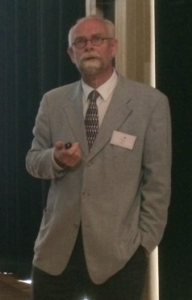 Prof. René Bakker presented “Recent Educational Technologies and Lean.” Prof. Bakker said that the value of university education should be expressed at the societal level due to government funding: to prepare students for stating in a profession, create human capital, and innovation. He suggested that class time as used in conventional lectures was waste, and that data on flipped classrooms indicates better grades, better learning, and greater student satisfaction. In particular, the courses where students have diverse knowledge of the subject matter, such as software programming, benefit from offline viewing video lectures. In cases where student’s knowledge of the subject matte is more uniform , other methods made be preferred.
Prof. René Bakker presented “Recent Educational Technologies and Lean.” Prof. Bakker said that the value of university education should be expressed at the societal level due to government funding: to prepare students for stating in a profession, create human capital, and innovation. He suggested that class time as used in conventional lectures was waste, and that data on flipped classrooms indicates better grades, better learning, and greater student satisfaction. In particular, the courses where students have diverse knowledge of the subject matter, such as software programming, benefit from offline viewing video lectures. In cases where student’s knowledge of the subject matte is more uniform , other methods made be preferred.
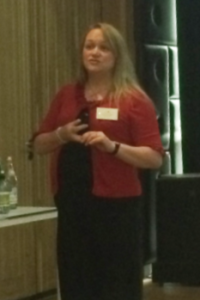 Dr. Tammi Sinha presented “Lean Principles and Tools Connected to Educational Core Activities.” Dr. Sinha described how Lean principles apply to teachers, researchers, administrative services, and students. She presented a detailed map of the seven wastes and described how they pertain to the work of educators, and highlighted the importance of creating a social space for people to engage in joint problem-solving and learning. Discussion was centered on what is waste and what is not waste, slow vs. fast cycle improvement via kaizen, and how to get administrators to look at other metrics to resolve disconnects in the perception of quality and value between faculty, administrators, and students.
Dr. Tammi Sinha presented “Lean Principles and Tools Connected to Educational Core Activities.” Dr. Sinha described how Lean principles apply to teachers, researchers, administrative services, and students. She presented a detailed map of the seven wastes and described how they pertain to the work of educators, and highlighted the importance of creating a social space for people to engage in joint problem-solving and learning. Discussion was centered on what is waste and what is not waste, slow vs. fast cycle improvement via kaizen, and how to get administrators to look at other metrics to resolve disconnects in the perception of quality and value between faculty, administrators, and students.
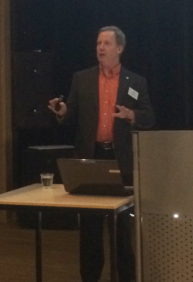 Dr. William Balzer presented his paper, “Why is the Broad implementation of Lean Higher Education Failing?” Dr. Balzer feels that Lean in higher ed is failing and suggested that rigorous scientific research is needed to demonstrate the effectiveness of Lean. In essence, he says that we must provide proof to university leaders that Lean works. Additionally, Dr. Balzer recommends using language that HE leaders understand and avoid Lean terminology which he suggests is a liability. He also suggested that the effectiveness of Lean transformation could be improved by the application of change management protocols, and organizational behavior diagnosis and organizational development interventions. There was a vigorous rebuttal and conversation of Dr. Balzer’s viewpoints and proposed approaches to gaining wider acceptance for Lean in HE.
Dr. William Balzer presented his paper, “Why is the Broad implementation of Lean Higher Education Failing?” Dr. Balzer feels that Lean in higher ed is failing and suggested that rigorous scientific research is needed to demonstrate the effectiveness of Lean. In essence, he says that we must provide proof to university leaders that Lean works. Additionally, Dr. Balzer recommends using language that HE leaders understand and avoid Lean terminology which he suggests is a liability. He also suggested that the effectiveness of Lean transformation could be improved by the application of change management protocols, and organizational behavior diagnosis and organizational development interventions. There was a vigorous rebuttal and conversation of Dr. Balzer’s viewpoints and proposed approaches to gaining wider acceptance for Lean in HE.
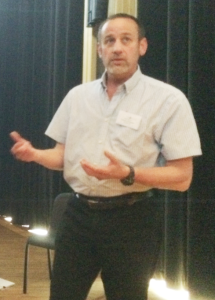 Mark Robinson & Steve Yorkstone (Steve, formerly of St. Andrews University) described the background and evolution of Lean at St. Andrews University. The story goes as follows: A senior university leader attended a Lean conference in 2005 out of curiosity [a good thing!]. There was no burning bridge to drive change; He just decided in 2006 that Lean would be good for the university and a good fit. The began with little in the way of structure or plan, which proved to be beneficial because doing so subverted bureaucratic norms and sped up improvement. Mark and Steve emphasized that Lean is fundamentally about people – engaging them to see the possibility of improvement, both large and small. It means to engage people to help make the university better, without fear of losing one’s job. The process of Improvement itself reveals the next improvement to make.
Mark Robinson & Steve Yorkstone (Steve, formerly of St. Andrews University) described the background and evolution of Lean at St. Andrews University. The story goes as follows: A senior university leader attended a Lean conference in 2005 out of curiosity [a good thing!]. There was no burning bridge to drive change; He just decided in 2006 that Lean would be good for the university and a good fit. The began with little in the way of structure or plan, which proved to be beneficial because doing so subverted bureaucratic norms and sped up improvement. Mark and Steve emphasized that Lean is fundamentally about people – engaging them to see the possibility of improvement, both large and small. It means to engage people to help make the university better, without fear of losing one’s job. The process of Improvement itself reveals the next improvement to make.
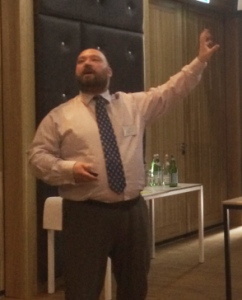 Steve Yorkstone of Edinburgh Napier University energetically described his efforts to help build a community of Lean facilitators and practitioners via Lean HE Hub. The web site has undergone further development since its debut last year and includes a map showing Lean activity in higher education. There was discussion about combining two Lean HE conferences into one, which everyone agreed to. This was followed by a discussion on where to hold the next conference. An associate provost at the University of Waterloo in Canada volunteered to host the 2015 conference, an offer which will likely be approved by the committee. The 2016 conference will likely be held at the University of Sheffield or Loughborough University in the U.K. There was additional discussion on the formation of regional Lean Higher Ed networks, so that people could interact and work together between annual meetings at the internal conference.
Steve Yorkstone of Edinburgh Napier University energetically described his efforts to help build a community of Lean facilitators and practitioners via Lean HE Hub. The web site has undergone further development since its debut last year and includes a map showing Lean activity in higher education. There was discussion about combining two Lean HE conferences into one, which everyone agreed to. This was followed by a discussion on where to hold the next conference. An associate provost at the University of Waterloo in Canada volunteered to host the 2015 conference, an offer which will likely be approved by the committee. The 2016 conference will likely be held at the University of Sheffield or Loughborough University in the U.K. There was additional discussion on the formation of regional Lean Higher Ed networks, so that people could interact and work together between annual meetings at the internal conference.
Recall the conference objectives:
- How to get teaching staff and administration on-board.
- Set a research agenda for Lean in higher education.
- Strengthen the community of practitioners.
Overall, I’d say the three conference objectives were met. Once again, a big thank you to HAN University for hosting the conference, and to Dr. Vincent Wiegel and Lejla Brouwer-Hadzialic for their hard work to organize the conference and assure successful outcomes.
I hope you will join in the fun and the learning next year at the 3rd annual conference in Waterloo, Canada!
